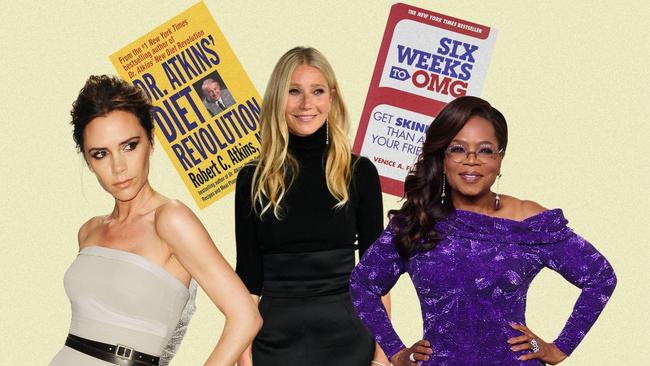Diet culture is dead! This is what it did to Gen X
In an era of calorie counting, body shaming stopped Victoria Beckham from going to the beach. Gen Z can’t believe how we behaved.

There’s a viral video on Instagram, a compilation of clips from a few decades ago in which women, often high-status celebrities, are shamed for their weight: it’s as nostalgic now as copying the Master Cleanse lemon juice fast Beyonce once promoted on The Oprah Winfrey Show to fit into a pair of bootcut jeans.
This was the era when a normal-sized Martine McCutcheon was repeatedly shamed as a big-thighed “plumpy” in Love Actually. The video shows Simon Cowell telling a sweet X Factor hopeful that she’s so overweight she looks like a “shop girl”; and two Kardashian sisters are separately told by their boyfriend and stepfather respectively that they are unattractive after having put on a few pounds. It ends with Victoria Beckham on a popular British talk show, a few months after giving birth to her first child, Brooklyn, in 1999, being forced, live on air, to stand on weighing scales and broadcast her weight to the nation. “This is horrible,” Beckham says as she reluctantly steps up.
We can understand, then, why Beckham this week described her struggle with diet culture thus: “After I had Brooklyn, my first outing was on the front page of the newspaper, with arrows pointing to where I needed to lose weight,” as well as mentioning her lifelong commitment to “be very disciplined with the way that I eat”. For many decades from the Eighties, diet books such as Dr Atkins’s New Diet Revolution and The Dukan Diet became international bestsellers and a cultural phenomenon: in the early Noughties a survey found that 1 in 11 North American adults were on low-carb diets.
David Beckham has reported on a podcast that “since I met Victoria she only eats grilled fish, steamed vegetables – she will very rarely deviate from that”. Victoria told Grazia that her weight insecurity “has robbed me of some experiences”, like sitting on a beach to watch her children play. David once remembered fondly the never repeated night of their married life when Victoria tried a bite from his plate – “it was the most amazing thing”. She avoids oil or butter. She even had a birthday “cake” made from watermelon with a candle on top, which she posted on Instagram with the title “Lucky mummy”.

Yet, at 50, is Beckham a relic of her age, like the punitively self-denying saints of vanished civilisations? While the extremely restrictive diets of the Eighties and Nineties were so famous as to go under one name, like the celebrities we aspired to, they have now disappeared from the bestseller charts. The last diet book to break through in the same way was Michael Mosley’s The 5:2 Fast Diet, in 2013, responsible for a craze of coffee-breathed hangriness.
Dieting is now old-fashioned. A decade of body positivity among Generation Z makes it impolite, if not “triggering”, to comment on a woman’s weight. Meanwhile, Instagram and TikTok stars have popularised a gym culture that promotes health via enslavement to diet and exercise tracking apps, where macronutrients, or “macros”, are the new calorie-counting. (Macros are protein, fat and carbohydrate, and each will be tracked against calorie expenditure measured through smart watches. Anyone on a “cut” – wanting to lose body fat – will go into a small calorie deficit, generally by cutting carbohydrates.) This makes diets such as “only eating Special K” look absurd now, but some would say tracking macros is calorie-counting on steroids for the digital age.
And, of course, the new weight-loss drugs such as Ozempic don’t just melt away fat, they kill the golden goose that was the diet industry itself. Last year the diet company Jenny Craig filed for bankruptcy, while WeightWatchers and Noom have made big cuts, with a hasty pivot to a “telehealth” model that can prescribe weight-loss drugs. Linda Anegawa, Noom’s chief medical officer, told Fortune magazine: “We’re probably looking at the demise of dieting.” Or, in other words, diet culture is dead, long live diet culture!

“I haven’t seen any sign that our appetite for improvement has gone,” says Stephanie Milner, publishing director of Ebury Food, one of the biggest producers of food-related books, “but it morphs into different versions of itself.”
This leaves the likes of Beckham and Gwyneth Paltrow, her American equivalent, looking stuck in the 20th century. Paltrow said in a podcast last year that she ate bone broth for lunch and had dinner “according to paleo”, awarding her comparisons to the “almond moms” who grew up in Nineties diet culture. The moniker “almond mom” comes from a conversation filmed between the model Gigi Hadid and her mother. Hadid says she is feeling faint as she has only eaten “half an almond”, to which Yolanda responds strictly: “Have a couple of almonds, and chew them really well.”
By contrast, Grace Beverley is typical of younger influencers. The British entrepreneur has a million Instagram followers and her Shreddy program seems by its name to promise transformational weight loss of the old-school kind, but ostensibly focuses on hard gym sessions.
“People aren’t admitting diet is a primary purpose,” says Katya Shipster, publishing director of Harper Nonfiction. “It feels like the culture has moved on, to longevity and health, in which weight loss is a by-product.”

Shipster remembers titles from a bygone age, such as Six Weeks to OMG: Get Skinnier Than All Your Friends (2012), when the buying public was interested in short-term “bikini body for summer” programs that now “seem completely mad”. Medical literacy has improved: the public understands that Ozempic or lifestyle change have to be sustainable for life.
In 1996 Helen Fielding had Bridget Jones, in her eponymous diary, write that she had “spent so many years being on a diet that the idea that you might actually need calories to survive has been completely wiped out”. The 2024 Bridget would be posting her protein macros on Insta instead.
In 2002 Oprah wrote that she had tried almost every diet but she was finally at “peace with my body”. She wasn’t. She’s now lost weight through Ozempic-type medication and has sold her shares in WeightWatchers.
The Times





To join the conversation, please log in. Don't have an account? Register
Join the conversation, you are commenting as Logout